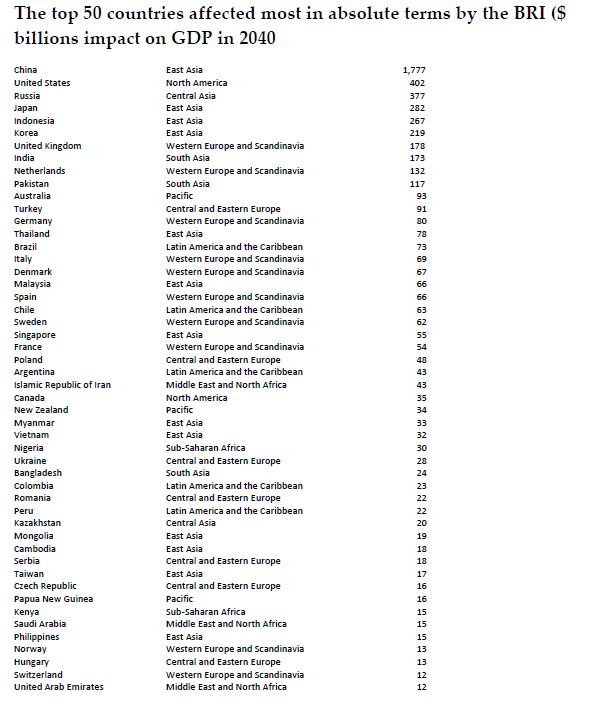Global economic consultants of Centre for Economics and Business Research in the UK launched a study, according to which the global economic impact of the Belt and Road Initiative is most likely to boost world GDP by $7.1 trillion per annum by 2040.
The key findings of the report are
- The benefits of the BRI are widespread. As many as 56 different countries are forecast to have their annual GDP in 2040 boosted by more than $10 billion as a result of the project.
- Other than China, which by 2040 will be by far the world’s largest economy and which will therefore benefit from any boost to the world economy, the biggest single potential beneficiary of the BRI is (surprisingly) likely to be the US, even though it isn’t participating directly in the project. This is because of the sheer size of the US economy which means that it gains from the indirect effects of world GDP being boosted. Even though the boost to US GDP is only 1.4% (much smaller than most other major economies) the absolute size of the US economy is still such that this is more than the absolute boost to any other economy except China.
- The next largest impact is in Russia, followed by Japan, Indonesia, Korea, UK, India and the Netherlands.
- The region of the world that will most be transformed by the BRI is likely to be Central Asia and Russia where we predict that GDP in 2040 will be 18% higher. GDP is also likely to be boosted in Central Europe (6%) Western Europe (5%) and East Asia (5%).
- The largest proportional impacts are in Mongolia, Pakistan, the Kirgiz Republic and Russia.
- Through the Belt and Road Initiative China will be continuing to drive world economic growth but in a different way than in the past. In the 10 years since the financial crisis in the West, China (now 15% of the world economy) has driven world demand by accounting for 40% of world GDP growth. Looking forward China will be driving world GDP growth helping the building of infrastructure throughout the world and through reducing both transport and other frictions that hold back world trade.
- The study also considers the impact that might emerge if the BRI is delayed for any reason such as a world economic slowdown or because of technical difficulties. If the spend is halved for example, world GDP (compared with the $2 trillion spend base case) will be reduced by $0.9 trillion or 0.5%. The region most affected will be Central Asia where GDP would be reduced by 5.9%.

The report concluded to the fact that as the BRI develops, it is likely to attract in further countries. Indeed it is highly likely that Western Europe, which has largely stayed aloof so far, will join in as the project develops momentum. It is even possible, though clearly unlikely under the current administration, that the US will also get involved in the BRI.






























































